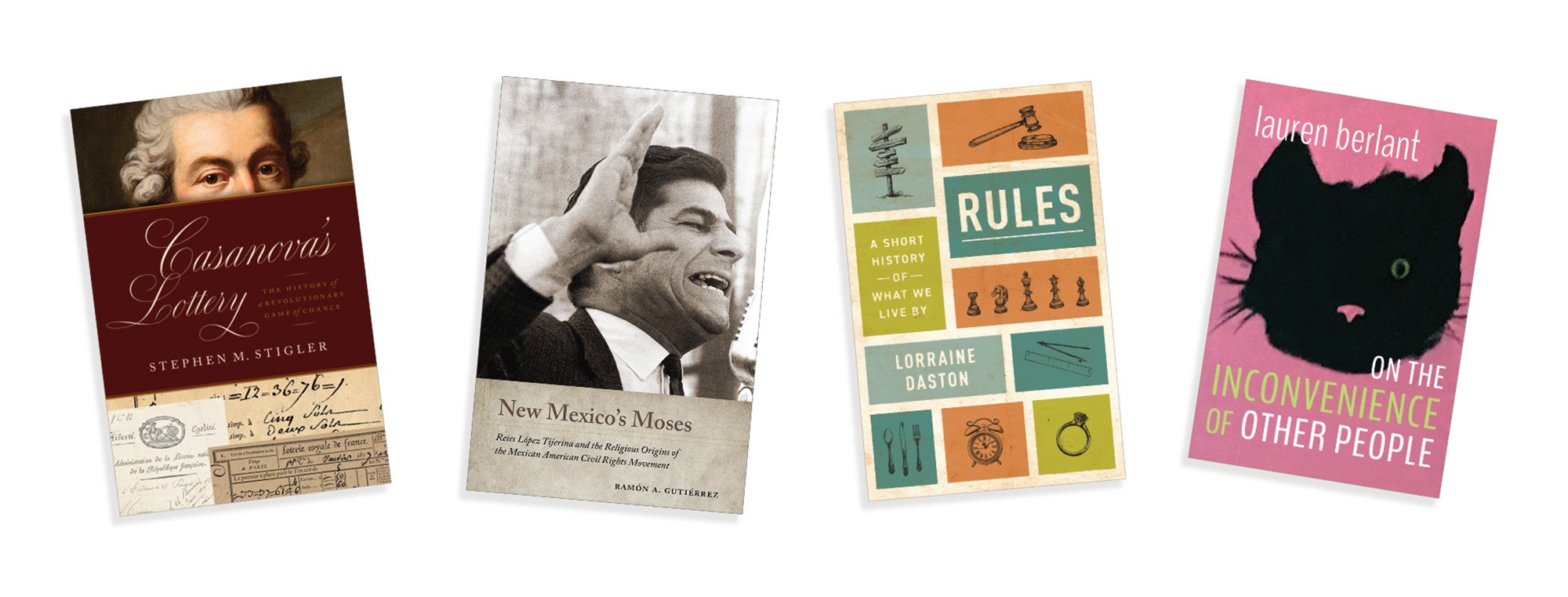
A selection of recent books by UChicago faculty members.
Casanova’s Lottery: The History of a Revolutionary Game of Chance
By Stephen M. Stigler, Ernest DeWitt Burton Distinguished Service Professor Emeritus, Department of Statistics
In 1994 a curious Stephen M. Stigler ordered a book by mail. Published in 1834, the gambler’s guide to France’s state Loterie was, he writes, “dirty, worn, and falling apart at the seams”—and drew him into a years-long investigation of the government betting game. Far from the first such contest, the Loterie was nonetheless of particular significance. Active for almost 80 years, except for a brief pause during the French Revolution, it introduced risk (calculated but real) into a national government’s financial management to a degree not seen before or since. For the public, too, the Loterie had lasting consequences, causing citizens to view risk in new ways and changing attitudes toward novel financial instruments.
New Mexico’s Moses: Reies López Tijerina and the Religious Origins of the Mexican American Civil Rights Movement
By Ramón A. Gutiérrez, Preston and Sterling Morton Distinguished Service Professor Emeritus, Department of History
Texas-born activist Reies López Tijerina began as a preacher who, with his family and a small group of other families, set up a cooperative village he called the Valley of Peace in the southern Arizona desert in 1955. By the 1960s, Tijerina had become an impassioned advocate for the descendants of dispossessed New Mexico landowners and an important leader in the Mexican American civil rights movement. In New Mexico’s Moses, historian Ramón A. Gutiérrez examines how Tijerina’s activism was shaped by his Pentecostal beliefs, and the religious origins of the movement as a whole. Among his sources are sermons from Tijerina’s preaching days, translated into English for the first time here.
Rules: A Short History of What We Live By
By Lorraine Daston, Visiting Professor, the John U. Nef Committee on Social Thought
A thorough history of rules, writes historian of science Lorraine Daston, would amount to “little short of a history of humanity.” From that “cat’s cradle of complexity,” her book identifies three consistent types of rules our species has used since ancient times: algorithms, models or paradigms, and laws. Having established these lasting categories, Daston—who has long taught at UChicago in full-time and visiting faculty positions—demonstrates how many forms rules take within them. For instance, they can fall anywhere along three axes: thick or thin in formulation; flexible or rigid in application; and general or specific in domain.
On the Inconvenience of Other People
By Lauren Berlant, The late George A. Pullman Distinguished Service Professor, Department of English Language and Literature (1957–2021)
In their final book, completed shortly before their death in 2021, cultural critic Lauren Berlant elaborated the concept of inconvenience, what they call “the affective sense of the familiar friction of being in relation”—especially with other people, whether in passing on the street or half a world away. That sense of inconvenience, they write, “may not achieve significance, consciousness, politics, or clarity,” but it attends our attachments and shapes our experiences—and, in Berlant’s vision, has revolutionary potential. The ubiquitous frictions Berlant analyzes—looking to sources as far-flung as Last Tango in Paris and the Occupy movement—Interfere with the fantasy of sovereignty over our own worlds and feelings, they argue. Grappling with the inconvenience of other people may offer a path to new forms of social being.
